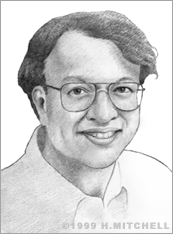Ashok Gadgil
Among Ashok Gadgil's many inventions is a water disinfection system, which can provide healthy drinking water to at-risk populations for about seven cents per person per year.
Gadgil was born in Bombay, India in 1950. He loved science as a youth and was already an award-winning student before earning degrees in Physics at the University of Bombay (BSc, 1971) and the Indian Institute of Technology at Kanpur (MSc, 1973). He moved to the U.S. to complete his formal education at the University of California at Berkeley, where he earned his MA in 1975 and his PhD in 1979. There, Gadgil became an expert on solar energy and heat transfer, especially as applied to temperature control in buildings.
In 1980, Gadgil began working at the Lawrence Berkeley National Laboratory (LBL) as a Staff Scientist in the Energy and Environment Technology Division. There, he created computer programs, later used worldwide, to run simulations of solar heat transfer systems. In 1983, Gadgil returned to India, where, at a Research Institute in New Delhi, he improved the efficiency and conservation of electrical power. By 1988, Gadgil had earned four Indian patents for solar heaters, but he was frustrated by the politics and bureaucracy that made it difficult for him to put his ideas into practice.
That year, Gadgil returned to LBL, which has remained his base of operations. Now Area Deputy for Science and Technology for the Energy Technologies area of Lawrence Berkeley National Laboratory, he has continued his work in energy efficiency, especially as a means of improving quality of life in developing countries. He has also become an expert in the detection and elimination of toxins and pollutants. Gadgil first worked on airborne pollutants, such as aerosol particles and radon.
In 1993, a deadly outbreak of cholera in India inspired Gadgil to focus on waterborne pollutants. About two thirds of the world's population still gets its water for drinking and cooking from outside of their homes. As a rule, this water is untreated and carries bacteria and disease, especially dysentery. In the developing world, over 400 children die from waterborne diseases every hour. In order to help, Gadgil invented a water purification system that is cheap, safe, capacious, sturdy, and simple to operate. The system uses ultraviolet light, rather than chemicals (like chlorine) or boiling (which can require tons of firewood per day) to purify the water.
Ultraviolet (UV) light has been used in European water treatment plants since the end of the 19th century. Gadgil's "UV Waterworks" includes some technical improvements over these; but more importantly, it helps those who need it the most. Water is pumped or poured into a large basin. Gravity draws the water through a shallow pan, over which shines a low-pressure mercury arc lamp that lacks the UV-light-blocking phosphor glazing that a fluorescent household lamp would have. As the water flows past, at a rate of 15 liters per minute, the lamp's radiation deadens the DNA of any bacteria, viruses, or molds. Water infested with as much as 1,000,000 E. Coli bacteria per liter leaves the system completely clean.
Since 1993, Gadgil and his team have field tested UV Waterworks in northern India and other rural areas of developing countries. The system has been a consistent success, and one unit can serve 1,000 people for about $70 per year. The major challenge is to guarantee a power supply – although its 40-watt bulb could be run on a car battery. Gadgil conceived an innovative, accelerated commercialization strategy, which has succeeded in Mexico and Brazil. Today, UV Waterworks has been employed by Water Health International Inc. and provides affordable, safe drinking water to more than 5 million people in Ghana, India, Liberia, Nigeria, and the Philippines, among many other countries.
Gadgil has invented many other safety devices, from an "Airvest" that channels toxic paint fumes away from the painter to an inexpensive way to build radon resistant homes.
Ashok Gadgil is admired by scientists and scholars all over the world for both his technical expertise and his determined devotion to improving the human condition. He advises and serves many national and international organizations, such as UNICEF, and has won many awards, including the 1996 Discover Award in the Environment category. Gadgil is one of seven scientists that was featured in a full-length documentary about motivation and inspiration, directed by Michael Apted. The documentary, titled "Me and Isaac Newton," was commercially released in November 2000.
In 2012, Gadgil was awarded the Lemelson-MIT Award for Global Innovation.


